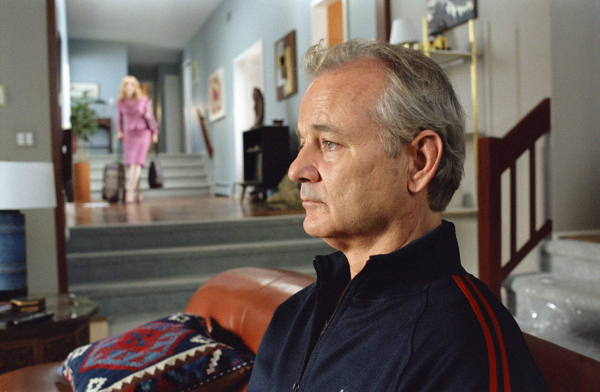Movie review by Greg Carlson
Writer-director Jim Jarmusch, a longtime cult favorite among fans of smart, self-aware comedies pregnant with arid wit, has made one of the year’s best films in “Broken Flowers.” Equally crafty and stirring, the great filmmaker forges a terrific partnership with Bill Murray, who previously appeared with the Wu-Tang Clan’s GZA and RZA in Jarmusch’s black and white “Coffee and Cigarettes” omnibus. This time, the movie is in color, and Frederick Elmes’ masterful photography delights the eye – particularly in the presentation of the many vivid pink objects that become clues in the movie’s central, unsolvable mystery.
Murray’s charming stoicism matches Jarmusch’s drollery beat for beat, so it is somehow perfect that the actor plays a character named Don Johnston, a well-chosen moniker that allows for several instances of purposeful comparison to both legendary lothario Don Juan and “Miami Vice” star Don Johnson. A newly retired computer expert content to lounge catatonically on his sofa in a comfy tracksuit, Don’s long term womanizing and inability to emotionally commit are summed up by departing lover Sherry (Julie Delpy), who leaves without eliciting much more than a look of resignation from Don.
Showing no signs of outward despair at the dissolution of his most recent relationship, Don hangs out with next-door neighbor Winston (Jeffrey Wright), a hardworking family man who by all appearances possesses everything that Don lacks. Sherry’s exit coincides with the arrival of an anonymous letter that suggests – in red ink on pink stationary – that Don fathered a son nearly twenty years ago. Winston insists that the strange note presents Don with an opportunity to seek out the mother of his child, and the amateur sleuth convinces Don to track down the women who shared his company two decades ago. Armed with Mapquest directions and a mix CD featuring Mulatu Astatke, Don begins his quest.
Employing Jarmusch’s easygoing, episodic structure, Don’s odyssey brings him face to face with four of the five women who might have sent the message (one, Don ruefully learns, is deceased). The reunion set-pieces are intriguing glimpses into the many paths one’s life can take, and the veteran performers are all superbly cast (although an almost unrecognizable Tilda Swinton has to make the most of fleeting screen time). Following an eye-opening interlude with Nabakovian daughter Lolita (an effervescent Alexis Dziena), Don reconnects with widow Laura (Sharon Stone), whose husband literally went up in flames in his racecar. Dora (Frances Conroy) lives with husband Ron (Christopher McDonald) in an antiseptic McMansion light years away from her flower child days. Animal communicator Carmen (Jessica Lange) seems startled by Don’s surprise arrival, and is relieved when her skeptical receptionist (Chloe Sevigny) interrupts to cut the visit short.
By the time Don arrives at the home of Penny (Swinton), Jarmusch has made it clear that the journey has been the destination. Audiences seeking some kind of conclusive answer or solution to Don’s original mission are likely to be disappointed, but Jarmusch treats his story and his characters with such dignity and interest, wrapping things up with a ribbon would have been an insult and a miscalculation (though Jarmusch die-hards will spend much time debating whether the film’s coda goes too far). At its best, however, “Broken Flowers” bears the signature Jarmusch touches that make his best films – like “Mystery Train” and “Dead Man” – sparkle with a certain lovely, inimitable distinctiveness.
